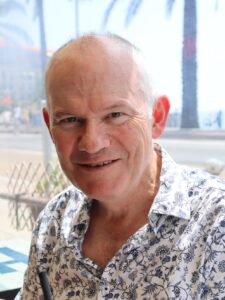Philosophers have puzzled for years why we sit through films that make us scream in terror yet have us laughing moments later.

Professor Derek Matravers
With Hallowe’en just around the corner, Derek Matravers, Professor of Philosophy at The Open University, ponders why some people love the experience and seek out more while others hate it.
So what kind are you? Do you remember your reaction when the severed head fell out the bottom of a boat in Jaws?
Or when Jack Nicholson, playing the character going through a psychological breakdown in The Shining, devilishly shouts “Here’s Johnny!” to his screaming wife, cowering the other side of the bathroom door, as he wields his axe into it again and again?
Derek says:
“Not everyone likes being scared, so I think the answer to that is probably more complicated than one might initially think – why people put themselves into positions of being scared, say by going to a horror movie.
“For evolutionary reasons it is linked to excitement – fright or flight instincts – so maybe being scared is about pushing the right kind of buttons for an effect that we enjoy.
No true danger in watching a horror movie
“One of the standard reasons why people deliberately put themselves into positions of being scared by seeing a horror movie is they can be scared without the thought they are in danger and therefore they enjoy it.
“To me, that can’t be the whole story. There are two things that are very bad about being scared – the first is the thought we are in danger and the second is that being scared is very unpleasant.
“If you ran the same experiment with respect to pain, it just wouldn’t work. One of the evolutionary functions of pain is presumably to indicate damage to our body.
“So, if I said to someone that I could give them intense feelings of being in pain without the thought of damage to the body nobody’s going to say, ‘yes that sounds good’.”
“So that’s a bit of a puzzle. You would argue the film has compensating elements in that you might learn something from the film, or admire the camera work but that doesn’t work for horror films as you wouldn’t hear many saying ‘I got something out of that despite the fact it was scary’.”
Screaming in delight
He points out that people do seem to enjoy being scared. Even a toddler will run away screaming in delight when a father pretends to be a bear.
“Fear appears to be linked in our psychology to more positive feelings including arousal. It’s telling that a bunch of emotions including fear and arousal tend to spill over into laughter because maybe we can’t quite cope with it. There isn’t an appropriate reaction if you can’t cope with something that is a bit much or a bit silly.”
The appeal of having to know an outcome
So what part does curiosity play in having to know who is in the deep, dark, scary cellar of a haunted house?
“A good point. I think we all like to know what happens at the end of a narrative. Even if you are watching something on the TV that’s not terribly good, you don’t want to go to bed until you find out whodunnit! I can imagine someone saying something similar about a horror movie.”
Turning to The Shining again, Derek added:
“So how does The Shining cause the emotions we feel whilst watching it? Well, we’re never really threatened by Jack Nicholson’s character. It’s just a representation. We know it’s just pictures of made-up stuff.”
He quotes philosopher David Hume who wrote in 1757:
“It seems an unaccountable pleasure which the spectators of a well-written tragedy receive from sorrow, terror, anxiety and other passions that are in themselves disagreeable.”
Derek said:
“Although Hume thought he had a solution, I agree with his initial claim that it is unaccountable. I think there are two sorts of people in the world, those who enjoy scariness and those sort who just find it very puzzling. And I’m of the second sort. Happy Hallowe’en.”
Visit a short film of Professor Matravers discussing why we become scared.
Main picture credit: Creatista for Shutterstock



